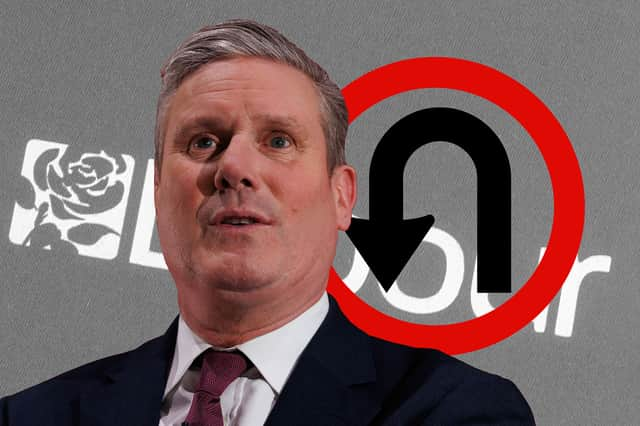Labour Party: all Keir Starmer’s U-turns as leader set to ditch £28bn green pledge
and live on Freeview channel 276
After months of doubt, Keir Starmer is set to finally ditch Labour's £28 billion-a-year green pledge.
Starmer will drop the spending commitment at an event today (8 February), blaming the current economic climate under the Conservatives. Environmental groups have hit out at the "dither, delay and lukewarm support" for UK climate action.
Advertisement
Hide AdAdvertisement
Hide AdThis latest U-turn gives Rishi Sunak a bit of a helping hand. The Prime Minister is keen to cast the Labour leader as someone who changes his mind, saying at PMQs that voters “cannot trust a word that he says”.
Last year, the Tories released special Starmer flip flops, to highlight his various screeching U-turns, and this focus is only set to heighten as the election gets closer. The Labour leader is giving them plenty of ammunition.
Previously this year, Labour has rowed back on capping bankers’ bonuses, saying it will keep them for “stability”. So with another reversal on the card, we've taken a look at all of the U-turns under Starmer.
Green prosperity plan
The green prosperity plan is turning into the ultimate U-turn for Labour. In 2021, Rachel Reeves claimed she wanted to be Britain’s first green Chancellor - and committed to spending £28 billion in Britain’s “green transition for each and every year of this decade”. This would help meet Labour’s promise to decarbonise the energy grid by 2030.
Advertisement
Hide AdAdvertisement
Hide AdHowever, every day this pledge looks more and more in doubt, with the Tories claiming it will force Labour to put up taxes and borrow more. Commentators have said the promise, one of the few transformational and bold policies Labour has announced, is now like an “albatross” around Keir Starmer’s neck.
The leader then said the £28bn will be delivered over the course of a Parliament, while last week Reeves refused to repeat the number on a call show. If you ask Labour figures, they say the economy has changed dramatically since Reeves made that pledge, with Liz Truss’ disastrous mini-budget and the war in Ukraine sending interest rates sky-rocketing.
Reeves says that all policies will be subject to her fiscal rules. However, it still begs the question, if Labour is going to U-turn on it’s most high-profile policy - what else is at risk (the answer is a lot - read on).


Bankers’ bonus cap
When Liz Truss announced she was scrapping the cap on bankers’ bonuses, brought in after the financial crisis in 2008, Labour was outraged. Starmer initially said that “pay rises for bankers” means “pay cuts for district nurses” adding it “shows the Tories are absolutely tone deaf to what so many people are going through”. While last October, Reeves tweeted saying axing the cap “tells you everything you need to know about this government”.
Advertisement
Hide AdAdvertisement
Hide AdHowever, last week Labour confirmed it would not be reinstating the cap. Reeves told journalists at the Labour Business Conference: “The cap on bankers' bonuses was brought in in the aftermath of the global financial crisis and that was the right thing to do to rebuild the public finances.”
“But that has gone now and we don't have any intention of bringing that back. And as chancellor of the exchequer, I would want to be a champion of a successful and thriving financial services industry in the UK.” A Labour spokesman said they wanted to provide the financial sector with stability. Now OpenDemocracy has reported that finance firms have donated £2 million to Labour over the two years ahead of the U-turn.
Two-child benefit cap
In February 2020, Starmer said he wanted to bring in legislation to see the two-child benefit cap scrapped. The policy, brought by George Osborne during the austerity period, blocks parents from claiming child tax credit or universal credit on their third child.
Leading children’s charities including Child Poverty Action Group, Barnardo’s and Save the Children, and organisations such as Church of England and the Joseph Rowntree Foundation, have called for the policy to be abolished. Critics have argued the policy has an adverse effect on the welfare of children and rather than lifting children out of poverty, it has become a “driving force”.
Advertisement
Hide AdAdvertisement
Hide AdAngela Rayner described it as “obscene and inhumane”, while former Shadow Work and Pensions Secretary Jonathan Ashworth said the policy was “heinous”. However now Starmer has announced Labour wouldn’t scrap the cap, which would cost around £1.3bn.
Nationalising utilities
When he was running to become Labour leader in 2020, Starmer promised public ownership of rail, mail, energy and water. He said: “Public services should be in public hands, not making profits for shareholders.”
While Shadow Transport Secretary Louise Haigh said last week that Labour still planned to nationalise rail services, Shadow Chancellor Reeves has effectively ruled out taking energy or water into public ownership, despite the sewage scandal. She said they were not compatible with her fiscal rules.
Starmer has said Labour would set up Great British Energy, which would provide state-powered electricity through renewables - however this would not incorporate nationalising private energy companies. In 2022, he said he was not “ideological” about nationalisation.


Abolish tuition fees
Advertisement
Hide AdAdvertisement
Hide AdStarmer’s pledges during the 2020 leadership election are coming back to bite him. In order to win over a party that adored leftie-granddad Jeremy Corbyn, as well as promising nationalisation, Starmer also said he would get rid of tuition fees.
However, last year, the Labour leader said they would have to get rid of this policy due to the financial climate his party is likely to inherit. He told the BBC: “We are looking at options for how we fund these fees. The current system is unfair, it doesn’t really work for students, doesn’t work for universities.”
Starmer said the party was looking at alternatives to the current system which he described as “unfair”, with reports stating that some Shadow Cabinet members were considering a graduate tax.
Free movement
As Shadow Brexit Secretary, Starmer promised a second referendum on Brexit. Then when running to be Labour leader he said he would “defend free movement” with the EU. Now Starmer says there’s “no case to rejoin the single market, customs union or the European Union”. That’s just one of the many Brexit U-turns Starmer has made over the years.
Digital services tax
Advertisement
Hide AdAdvertisement
Hide AdReeves previously announced plans to increase a 2% levy charged on tech firms’ revenues to 10%, which she said would raise £3.2 billion. Google would likely have been one of the main firms impacted, alongside Amazon and Facebook. This money would then be used to provide assistance to small businesses, the party said.
But last summer Labour confirmed that they would no longer go ahead with the plan, following reported concerns that it could prompt the US government to impose trade tariffs on UK exports to offset the lost revenue. A Labour Party spokesman told The Times the party had “no plans to raise digital services tax”.
Voting on war
Another of Starmer’s now-infamous leadership pledges was to change the law to have a Parliamentary vote on any military action. However this year, the UK has carried out three rounds of air strikes on the Houthis in Yemen, and Starmer is not demanding MPs have a say.
Advertisement
Hide AdAdvertisement
Hide AdStarmer has since told Laura Kuenssberg that a vote was only required when troops are deployed. Defence Secretary Grant Shapps told the Commons yesterday (5 February) that the UK government “will not hesitate” to bomb the Houthis again. So far, nothing more from Starmer on whether MPs should have a vote.
Ralph Blackburn is NationalWorld’s politics editor based in Westminster, where he gets special access to Parliament, MPs and government briefings. If you liked this article you can follow Ralph on X (Twitter) here and sign up to his free weekly newsletter Politics Uncovered, which brings you the latest analysis and gossip from Westminster every Sunday morning.
Comment Guidelines
National World encourages reader discussion on our stories. User feedback, insights and back-and-forth exchanges add a rich layer of context to reporting. Please review our Community Guidelines before commenting.
